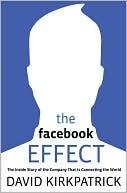The Facebook Effect - Review by Rebecca Binder '02

Defining friend: The many implications of Facebook
The Facebook Effect, by David Kirkpatrick '75 (Simon & Schuster)
"The world should be governed by people," Facebook CEO Mark Zuckerberg tells David Kirkpatrick in the early pages of Kirkpatrick's The Facebook Effect. The idealistic way Zuckerberg saw the world from his dorm room at Harvard University in the fall of 2004, as a fresh-faced 19-year-old surrounded by what he calls Harvard's "very liberal" values, could have given way to graduation, bills, rent and sudden onset of the real world. But Zuckerberg went on to create, develop and become the driving force behind Facebook.com. We'd be wise to take his comment seriously. Kirkpatrick certainly does: the former senior editor for Internet and technology at Fortune magazine, and the creator of the Techonomy conference, Kirkpatrick had intimate access to Zuckerberg and his team and used those opportunities wisely to paint a detailed picture of Facebook's past and its likely future.
In 2010, Facebook had 500 million active users worldwide. Although Facebook is, at its core, a purposefully simple social networking website, it is also a phenomenon: it ranks as the second-most visited website on the Internet, behind only the search engine Google. The Facebook Effect contains a laundry list of similar, mind-numbing, almost incomprehensible statistics. To humanize those numbers, Kirkpatrick provides examples of how Facebook has been the catalyst for collective action. He describes, for example, how one user organized a 300,000-person march against FARC, the Colombian guerilla group, literally overnight. He notes that Sarah Palin changed the course of American health care reform simply by posting a screed against "death panels" on her Facebook profile.
Kirkpatrick's detailed and animated recounting of Facebook's corporate history succeeds in large part because it does so much more: between the lines describing dinner meetings with potential buyers and brief, surprisingly engaging lessons in venture capitalism, Kirkpatrick shows that Zuckerberg and his team are more interested in pursuing what one early investor calls "the purest expression of good globalization" than in making scads of money (not to worry, though: Zuckerberg is the youngest billionaire in the world).
Facebook works, Kirkpatrick argues, because it requires that you identify yourself: very little anonymity exists on Facebook. Two innovations--photo-sharing and the News Feed--help members keep tabs on friends, and the search feature allows long-lost friends and relatives--even separated siblings--to reconnect. Readers will recall more mundane examples: playing Scrabble with an old college friend with an infuriating talent for hitting triple-word scores; panning through photographs of an Amherst roommate's daughter, and watching video of her first successful crawling mission (and subsequently clicking on a link to show that you "like" the video); and suggesting restaurants that a childhood friend from summer camp might want to try on her visit to your hometown. Increasingly, Facebook serves as a storage trunk for a user's entire lifetime of relationships. Eventually, Kirkpatrick predicts, Facebook will become a global address book, with everyone you've ever met (or want to meet) only one search box away. Kirkpatrick leaves the reader to speculate: Is it healthy to maintain relationships long past the point where they exist in the real world? How does Facebook change the way in which we define friend?
Kirkpatrick carefully compares Facebook to a Friendster.com, a failed predecessor. Friendster failed, he argues, because it got too big too quickly. The site's technology couldn't keep up with the demand. Facebook, meanwhile, controlled its own growth. In its early years, only people with school e-mail addresses could join, and Zuckerberg's team controlled which school's e-mail addresses the site would accept. As a result, Facebook could control who and how many people joined, and members were assured of each other's identity.
That reassurance, though, has led to members' concerns over their own privacy, especially as Facebook opened its network to everyone, regardless of school affiliation. Zuckerberg's philosophy, according to Kirkpatrick, is that users will eventually accept a more open, less private society, and that such change will benefit them. However, Kirkpatrick details several instances of member outcry following changes to the site's privacy settings, especially given Facebook's tendency to make less privacy the default setting, often without warning. Kirkpatrick implies that the way Facebook manages its members' privacy, while still pushing towards a more global society, will be a continuing concern. As a Friend of this reviewer posted to her Wall when the site recently introduced a feature (after the publication of Kirkpatrick's book) that would use the GPS on members' cell phones to broadcast their location: it's not a good sign when all the news you read about a new Facebook feature is instructions on how to turn it off.
Binder, a lawyer, wrote the Summer 2010 Amherst magazine feature I Was Never a Murderer.
Other Reviews